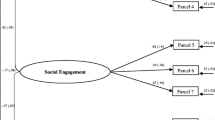Abstract
The behavioral patterns associated with peer ratings of aggression and withdrawal were explored. First, a discriminant function analysis (N=74) using seven observational variables was found to significantly identify groups of Aggressive, Withdrawn, and Contrast fourth-and fifth-grade girls and boys. Aggressive/Withdrawn children were not distinguishable from Contrasts. In subsequent analyses comparing the behaviors of children in the four groups at two schools (total N=117), children in the Aggressive and Withdrawn groups each showed distinctive patterns of social behavior, which were consistent across the two schools. The behavior of the Aggressive/Withdrawn children was not significantly different from that of Contrast children. However, results from one school suggested that Aggressive/Withdrawn children may receive a disproportionate amount of aggression from peers. Finally, the behavior patterns displayed by the deviant groups were similar for girls and boys, allowing for sex differences in base rates of playground behavior. These results confirm the observability of peer-identified patterns of aggression and withdrawal, and provide a detailed description of the behavior of such children in a free-play situation.
Similar content being viewed by others
References
Achenbach, T. M., & Edelbrock, C. S. (1978). The classification of child psychopathology: A review and analysis of empirical efforts.Psychological Bulletin, 85, 1275–1301.
Bower, E. M. (1969).Early identification of emotionally handicapped children in school (2nd ed.). Springfield, IL: Charles C Thomas.
Cowen, E. L., Pederson, A., Babigian, H., Izzo, L. D., & Trost, M. A. (1973). Long-term follow-up of early detected vulnerable children.Journal of Consulting and Clinical Psychology, 41, 438–446.
Feltham, R. F., Doyle, A. B., Schwartzman, A. E., Serbin, L. A., & Ledingham, J. E., (1985). Friendship in normal and socially deviant children.Journal of Early Adolescence, 5, 371–382.
Hartmann, D. P. (1977). Considerations in the choice of interobserver reliability estimated.Journal of Applied Behaviour Analysis, 12, 103–116.
Johnson, S. M., & Bolstad, O. D. (1973). Methodological issues in naturalistic observation: Some problems and solutions for field research. In L. A. Hamerlynck, L. C. Handy, & E. J. Mash (Eds.),Behavior change: Methodology, concepts, and practice (pp. 7–68). Champaign, IL: Research Press.
Kent, R. N., & Foster, S. L. (1977). Direct observational procedures: Methodological issues in naturalistic settings. In A. R. Ciminero, K. S. Calhoun, & H. E. Adams (Eds.),Handbook of behavioral assessment (pp. 279–328). New York: Wiley.
Ledingham, J. E., & Schwartzman, A. E. (1984). A 3-year follow-up of aggressive and withdrawn behavior in childhood: Preliminary findings.Journal of Abnormal Child Psychology, 12, 157–168.
Masten, A. S., Morison, P., & Pellegrini, D. S. (1985). A revised class play method of peer assessment.Developmental Psychology, 21, 523–533.
Michael, C. M., Morris, D. P., & Soroker, E. (1957). Follow-up studies of shy, withdrawn children II: Relative incidence of schizophrenia.American Journal of Orthopsychiatry, 27, 331–337.
Milich, R., & Landau, S. (1984). A comparison of the social status and social behavior of aggressive and aggressive/withdrawn boys.Journal of Abnormal Child Psychology, 12, 277–288.
Moskowitz, D., Schwartzman, A. E., & Ledingham, J. (1985). Stability and change in aggression and withdrawal in middle childhood and adolescence.Journal of Abnormal Psychology, 94, 30–41.
Moskowitz, D. S., & Schwarz, J. C. (1982). Validity comparison of behavior counts and ratings by knowledgeable informants.Journal of Personality and Social Psychology, 42, 518–528.
Pekarik, E. G., Prinz, R. J., Liebert, D. E., Weintraub, S., & Neale, J. M. (1976). The Pupil Evaluation Inventory: A sociometric technique for assessing children's social behavior.Journal of Abnormal Child Psychology, 4, 83–97.
Robins, L. N. (1979). Follow-up studies. In H. C. Quay & J. S. Werry (Eds.),Psychopathological disorders of childhood (2nd ed., pp. 483–513). New York: Wiley.
Schwartzman, A. E., Ledingham, J., & Serbin, L. A. (1985). Identification of children at risk for adult schizophrenia: A longitudinal study.International Review of Applied Psychology, 34, 363–380.
Serbin, L. A., Lyons, J. A., Marchessault, K., Schwartzman, A. E., & Ledingham, J. E. (1987). Observational validation of a peer nomination technique for identifying aggressive, withdrawn, and aggressive/withdrawn children.Journal of Consulting and Clinical Psychology, 55, 109–110.
Tabachnick, B. G., & Fidell, L. S. (1983).Using multivariate statistics. New York: Harper & Row.
Zax, M., Cowen, E. L., Izzo, L. D., & Trost, M. A. (1964). Identifying emotional disturbance in the school setting.American Journal of Orthopsychiatry, 34, 447–454.
Author information
Authors and Affiliations
Additional information
This research was supported by grants from the National Health Research and Development Program, Canada, and the F.C.A.R. of the Ministry of Education of Quebec. We are extremely grateful for the cooperation of the Commission des Écoles Catholiques de Montréal. The authors also gratefully acknowledge the helpful comment on an earlier version of this manuscript made by Drs. Anna-Beth Doyle and Debbie Moskowitz.
Rights and permissions
About this article
Cite this article
Lyons, J., Serbin, L.A. & Marchessault, K. The social behavior of peer-identified Aggressive, Withdrawn, and Aggressive/Withdrawn children. J Abnorm Child Psychol 16, 539–552 (1988). https://doi.org/10.1007/BF00914265
Revised:
Issue Date:
DOI: https://doi.org/10.1007/BF00914265




